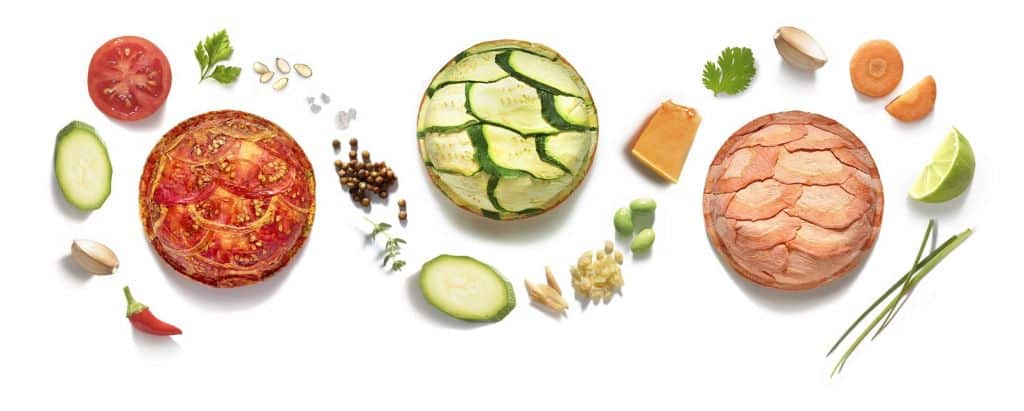Newsletter Signup - Under Article / In Page
"*" indicates required fields
Two industrial design students were so concerned by the huge amounts of perfectly good fresh produce being wasted, they spent two years working on a healthy solution.
Esti Brantz and Meydan Levy noticed that fruit and veg was getting tossed in the trash due to cosmetic reasons such as size, shape, color differences, or similar perceived imperfections.
Living across from a bustling farmers market located in the heart of Jerusalem, surrounded by fresh produce and herbs carrying exotic flavors and aromas, they sought a solution to the food waste challenge.
“We buy leftover produce directly from farmers,” explains Brantz. “This provides them income for vegetables they usually have to discard.”
Leftover vegetables
With the leftover vegetables they spent two years testing various techniques before settling on one that worked best to preserve the components of a heat-and-eat meal. This led to the design of an entirely new food concept.
From that, Anina was founded in June 2020 by Anat Natan, Meydan Levy, and Esti Brantz. Natan, the CEO, brings more than 20 years of experience in marketing and business management for consumer packaged goods companies such as Nestlè and Tnuva.
Anina says it is reshaping the future of ready meals by merging art with technology through a culinary experience of meals from upcycled vegetables.
According to the United Nations Food and Agriculture Organisation, a staggering 1.3 billion tons of food is wasted every year, across the world. That’s one-third of all food produced for human consumption.
Chronic undernourishment: 820 million people
And The Eco Experts say it all adds up to more than three trillion meals wasted over the course of each year. This is especially alarming when more than 820 million people suffer from chronic undernourishment – more than 10 per cent of the global population.
Calculating this, the organization says, if the world’s wasted food was given to chronically undernourished people, it would provide each person with 3,659 meals per year, which is 10 meals per day.
To play their part in reducing food waste, the team created the Anina pod, which is a complete meal made from vegetables that have been rejected for sale due to a less-than-perfect appearance—a major source of fresh produce waste. Each whole meal-in-a-pod is all-natural, loaded with nutrients.
The meals, the company says are produced in a ready to cook format, single size portion that provides a quick, nutritious meal in minutes.
Nutritional requirements
It can be cooked on the stovetop or in a microwave. Each disc-shaped container holds two full cups of vegetables—40 per cent of an adult’s daily nutritional requirements.
The range was launched in Israel with three recipes including pasta primavera, a Mediterranean bowl and a Vietnamese bowl.
The technology is patented, from the food-grade lamination process to the pod structure. The unique technology forms flexible sheets from fresh vegetables .
Natan, co-founder and CEO, said: “Anina is making a real impact on the food industry by mitigating food waste and turning it into innovative, plant-based products with an exciting look and feel.
“The result is a balanced, delicious meal with all the nutrients you need. Anina is responding to a growing demand for making the most of unwanted veggies, and turning them into something artistic that appeals to the eye and palette. Following the successful product launch in Israel and the positive feedback we received from American millennials, we are set to bring our products to the US.”
Anina uses minimal processing
Mor Wilk, vice president of research and development for Anina, said: “We produce these vegetable sheets with minimal processing, preserving the flavors, aromas, colors, and textures of the original vegetable. The heart of our technology is the creation of the layers.
“The heart of our technology is the creation of vegetable sheets. The flexibility of these sheets enables us to form any 3D structure and create any recipe in a decorative pod, each set to its unique controlled cooking time.”
The container’s outer shell is made from a layer of dried vegetables or fruits, while the inner core contains a range of natural ingredients. The ingredients, of course, vary according to each recipe.
The team says upcycling provides a highly sustainable solution to food waste while supporting a circular economy and Anina is on a continuous mission to find new ways to improve efficiency, prevent waste, and reunite consumers with nutritious food.
Anina is shaping the future
“We’re changing the way we eat,” adds Natan. “And we’re shaping the future for a meaningful culinary consumer experience. The Anina meal capsule also addresses today’s fast-paced lifestyle, which too often forces consumers to compromise on the quality of the food they eat.
Anina has secured $3.3 million in a safe round from Strauss Group by The Kitchen Hub, Unovis, Unorthodox ventures, AgFunder VC, Wordcreate Inc., and the Israeli Innovation Authority (IIA).
Partnering 2030: FME Industries Report







